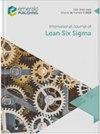在应对新冠肺炎疫情的同时,精益建筑和韧性:对巴西建筑公司的分析
IF 3.7
2区 工程技术
Q2 ENGINEERING, INDUSTRIAL
引用次数: 4
摘要
目的尽管精益哲学的实施带来了好处,但最新的研究讨论了在当前的疫情情况下,实施精益哲学所获得的高度效率是积极的还是消极的。本研究旨在分析巴西建筑业公司在面对新冠肺炎疫情时的韧性,比较不同精益建筑实施水平的建筑公司的表现。设计/方法/方法在巴西的建筑公司中进行了三个案例研究,这些公司具有不同的精益哲学应用水平。发现在获得的结果中,那些实施精益哲学水平较高的人在面对新冠肺炎时表现出了更大的韧性。此外,调查发现,接受调查的公司规模越大,精益理念的实施水平就越高。研究局限性/影响由于疫情状态和在家庭办公室进行的工作,与公司的联系受到限制。此外,在巴西的建筑行业,很少有公司真正采用精益理念。大多数公司在特定行业只使用少数精益施工工具。对于少数真正实施这一哲学的人来说,参与这项研究的接受度很低。独创性/价值对于巴西的建筑业来说,精益建筑是一种非常新颖和创新的东西,几乎没有证据表明它的用途。在这个国家,很少有公司采用这种哲学,其中许多公司在其整个存在过程中也没有经历过如此有影响力的时刻。因此,分析巴西民用建筑部门的精益建筑与弹性之间的关系是一种创新。本文章由计算机程序翻译,如有差异,请以英文原文为准。
Lean construction and resilience while coping with the COVID-19 pandemic: an analysis of construction companies in Brazil
Purpose
Despite the benefits provided by the implementation of the lean philosophy, the most recent research discusses whether the high degrees of efficiency obtained with the implementation this philosophy could contribute positively or negatively in current pandemic scenario. This study aims to analyze how resilient construction industry companies in Brazil were in the face of the COVID-19 pandemic, comparing the performance of construction companies with different implementation levels of lean construction.
Design/methodology/approach
Three case studies were carried out in construction companies in Brazil with different application levels of the lean philosophy.
Findings
Among the results obtained, greater resilience to face COVID-19 was verified in those with a higher implementation level of the lean philosophy. Additionally, it was found that the larger the size of the companies surveyed, the greater the level of implementation of the lean philosophy.
Research limitations/implications
Due to the state of pandemic, and the work carried out in the home office, contact with companies was restricted. In addition, few companies actually adopt the lean philosophy in the construction sector in Brazil. Most of companies use only a few lean construction tools in specific sectors. For the few others who actually implement the philosophy, the acceptance to participate in the research was low.
Originality/value
The lean construction is something very new and innovative for the construction sector in Brazil, and there is little evidence of its use. Few companies adopt the philosophy in the country, and many of them also did not experience such an impactful moment in their entire existence. Thus, the analysis of the relationship between lean construction and resilience in the civil construction sector in Brazil is something innovative.
求助全文
通过发布文献求助,成功后即可免费获取论文全文。
去求助
来源期刊

International Journal of Lean Six Sigma
Engineering-Industrial and Manufacturing Engineering
CiteScore
8.90
自引率
15.00%
发文量
46
期刊介绍:
Launched in 2010, International Journal of Lean Six Sigma publishes original, empirical and review papers, case studies and theoretical frameworks or models related to Lean and Six Sigma methodologies. High quality submissions are sought from academics, researchers, practitioners and leading management consultants from around the world. Research, case studies and examples can be cited from manufacturing, service and public sectors. This includes manufacturing, health, financial services, local government, education, professional services, IT Services, transport, etc.
 求助内容:
求助内容: 应助结果提醒方式:
应助结果提醒方式:


